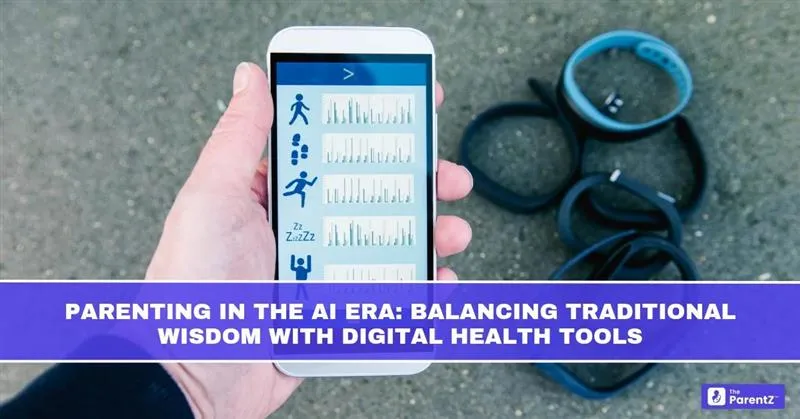Not long ago, parenting advice came mainly from grandparents, neighbors, or family doctors. Today, however, a parent may find themselves checking a baby monitor connected to a smartphone, getting diet tips from a health app, or even relying on artificial intelligence (AI) to interpret a child’s dental X-ray.
We are living in a world where parenting meets technology every single day. For some parents, this feels empowering. For others, it feels overwhelming. But the truth lies somewhere in between: digital health tools can support parenting, but they can never replace the timeless wisdom of love, intuition, and tradition.
This balance between old and new is what defines parenting in the AI era.
What Is AI and Why Is It Everywhere?
Artificial intelligence (AI) simply means machines that can “think” or “learn” from data. Unlike regular computer programs that follow fixed rules, AI can analyze huge amounts of information, recognize patterns, and make predictions.
In healthcare and parenting, this shows up in many ways:
- Baby sleep apps that track patterns and suggest the best nap times.
- Wearables that monitor children’s activity levels or heart rates.
- Smart toothbrushes that track brushing habits and give scores.
- AI-assisted scans that help dentists or doctors detect cavities or illnesses early.
These tools promise accuracy and convenience. But do they always know what’s best for your child? That’s where parenting wisdom comes in.
Why Traditional Wisdom Still Matters
Every Indian parent has heard home-grown advice from grandparents or elders—turmeric milk for colds, hing paste for colic, or oil massage for stronger bones. Some of these remedies are now backed by science, while others simply work because of the comfort and care they provide.
Traditional parenting wisdom focuses on:
- Observation: Parents and grandparents notice changes in mood, appetite, or play.
- Emotional care: A hug, a lullaby, or simple reassurance can calm a child better than any device.
- Values and culture: Bedtime stories, prayers, or rituals provide stability and identity.
AI can measure sleep cycles, but it cannot feel your child’s restlessness at 2 AM. It can analyze growth charts, but it cannot understand the smile your child gives after a comforting cuddle.
This is why human wisdom remains at the heart of parenting.
The Benefits of Digital Health Tools
While tradition is invaluable, modern tools also bring undeniable benefits:
- Early Detection: AI-powered scans can pick up cavities or bone changes before they are visible to the human eye. This helps in starting treatment early and avoiding complications.
- Better Monitoring: Parents can track a child’s sleep, steps, or calorie intake with accuracy—useful for children with special health needs.
- Convenience: Virtual consultations and AI chat support save time, especially for working parents.
- Data-Driven Confidence: Instead of guessing, parents can use reports to back decisions, making conversations with doctors more effective.
- Prevention Focus: Many AI apps nudge parents toward preventive habits, like reminders for dental check-ups, vaccinations, or healthier snacks.
Where AI Is Changing Pediatric Dentistry
Dentistry is a great example of how AI and tradition can work together. Pediatric dentists are beginning to use AI for:
- Cavity detection in X-rays, sometimes spotting issues parents wouldn’t notice until pain begins.
- Growth prediction, showing how a child’s teeth may develop over time.
- Treatment planning, especially for braces and aligners.
- Behavior management, by predicting which children might need extra comfort strategies.
But even with all this technology, a dentist still relies on the parents’ observations: Does the child avoid cold foods? Do they complain of pain at night? These stories, passed on by attentive parents, remain essential.
How to Balance Both Worlds
Finding balance between AI and parenting wisdom doesn’t have to be complicated. Here are practical ways parents can do it:
1. Use AI as a Guide, Not the Decision-Maker
If an app shows that your child slept only 8 hours instead of 10, don’t panic. Use it as a conversation starter with your doctor, not as the absolute truth.
2. Keep Emotional Connection Strong
No app can replace the comfort of a parent’s hug or the joy of family storytelling. Keep those traditions alive, even as you explore digital tools.
3. Choose Tools Wisely
Not all apps or gadgets are reliable. Look for those recommended by pediatricians or trusted health organizations.
4. Teach Children Digital Boundaries
Children learn by watching their parents. If you balance screen use with real-life play, they will do the same. Encourage outdoor activity, creativity, and conversations alongside digital learning.
5. Stay Involved With Doctors
AI can support diagnosis, but your pediatrician or dentist knows the full picture. Always combine AI insights with professional guidance.
Parenting Stories: A Blend in Action
Imagine this:
- A mother notices her child often snores at night (traditional observation).
- An app shows irregular sleep cycles (digital tool).
- The dentist reviews both and discovers enlarged adenoids (professional diagnosis).
Here, all three: parental wisdom, AI support, and medical expertise, worked together to improve the child’s health.
Another story:
- A grandmother suggests mustard oil massage for stronger gums.
- Meanwhile, an AI toothbrush app tracks brushing and rewards the child with stars.
- Together, they create a routine that is both culturally rooted and tech-supported.
These examples show that balance is not about choosing one over the other; it’s about combining both.
The Risks of Over-Reliance on AI
While AI is useful, depending solely on it has risks:
- False alarms: Apps may overestimate problems, creating unnecessary anxiety.
- Data privacy: Sensitive health data may not always be secure.
- Reduced intuition: Parents may stop trusting their instincts if they rely only on numbers.
This is why human judgment must stay central. AI should act like a helpful assistant, not the main caregiver.
Looking Ahead: The Future of Parenting with AI
In the coming years, AI in parenting may grow even stronger. We may see:
- Smart toothbrushes that instantly send cavity reports.
- AI nutrition apps that analyze a child’s thali and suggest balance.
- Virtual assistants reminding parents about growth milestones and check-ups.
Yet, what will never change is the child’s need for human love, storytelling, traditions, and presence. Technology can make parenting smarter, but only parents make it meaningful.
Final Thoughts
Parenting in the AI era is not about choosing between tradition and technology. It’s about finding a balance where both support each other.
AI tools can help with accuracy, reminders, and early detection. Traditional wisdom adds emotional care, cultural grounding, and intuition. Together, they form a complete circle of parenting: strong, informed, and compassionate. So the next time you open a health app or visit a pediatric dentist who uses AI, remember: the technology is there to help, but the heart of parenting still lies in your instincts, your care, and your timeless wisdom.
That balance is what will raise children who are not just healthy, but also happy and rooted in love.





Be the first one to comment on this story.